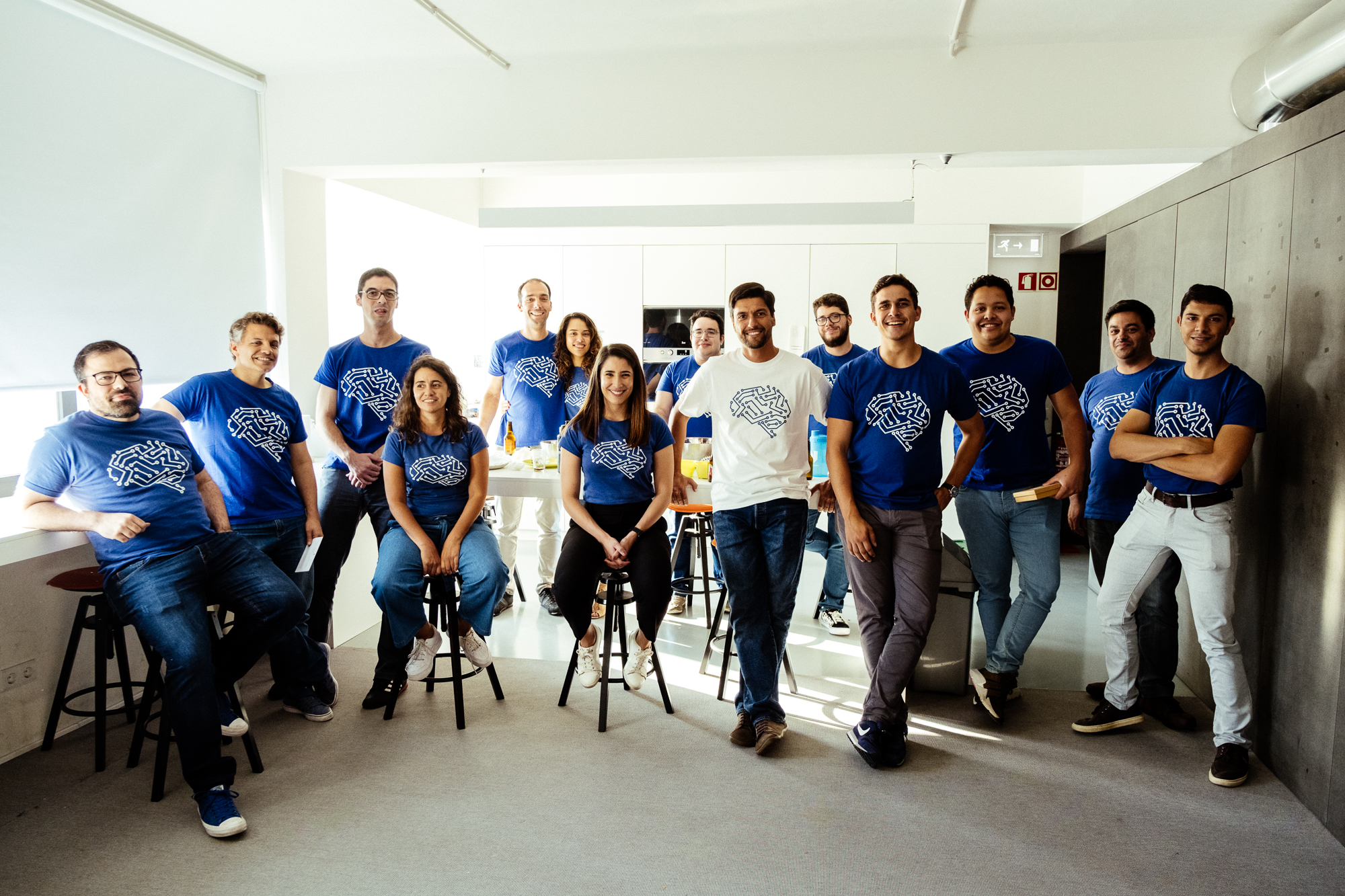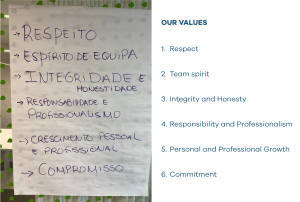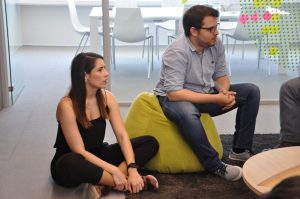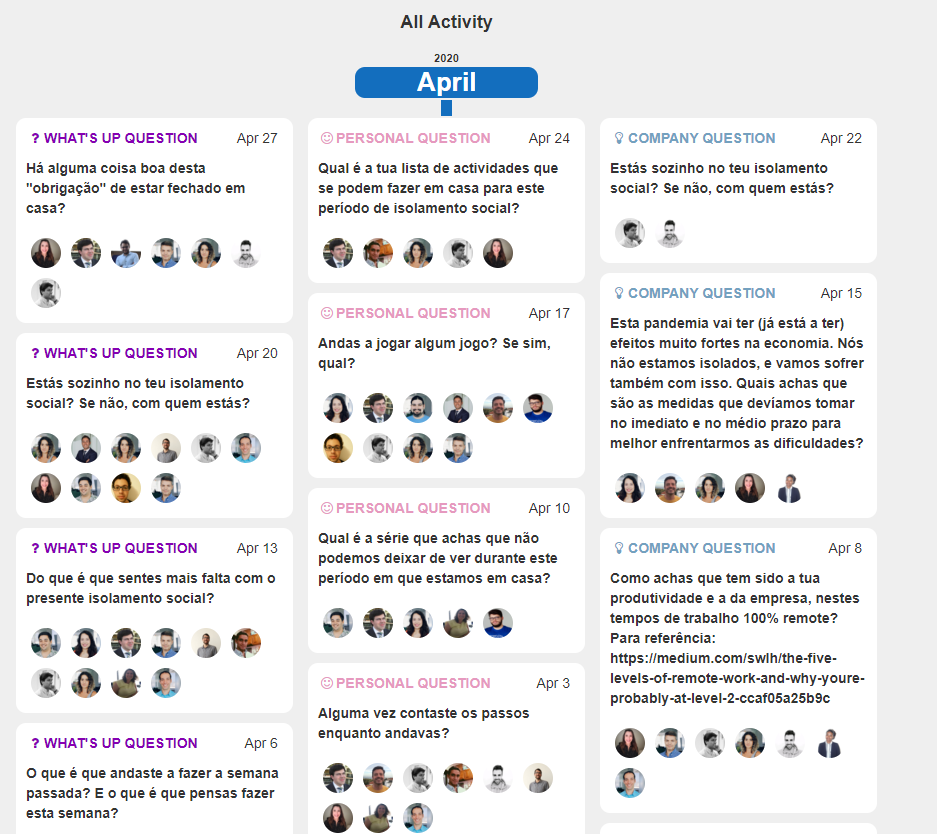Last month, I celebrated 3 years working at the Near Partner. In fact, I’ve been in the company for longer than it has formally existed! When I joined the company, it didn’t even have a name but through my conversations with Pedro Veloso, I found the security, support, and the challenge I was looking for.
I knew what our goals were, the people we wanted to hire and, above all, the company we did not want to be. No doubt that we would be a great software house.

I was super excited with the project and kind of proud to be at the meeting where the official name of our company was chosen. As a recruiter, my job was to find the people who would be my teammates for years to come. What a challenge and a responsibility… But I am one of those people who believes that nothing happens by chance and even when we hire someone, we need a bit of luck (although luck is achieved with a lot of work).
In less than 1 year, we went from 2 to 7 people. Starting a project from scratch has been one of the most beautiful challenges I have experienced. Today, we are 22 proud Partners 😀
Great culture requires work
One of my goals with Pedro was to build a great Culture. From day one, we decided to put work, empathy, mutual help, and kindness to each other in our top priorities. We believe that that is the basis of our culture today.
There are several reasons that make me have such a confident view of our culture. And I’m not just saying it because it is my opinion, it is supported by the feedback I receive frequently. This feedback happens from the moment a coworker refers a friend or former co-worker to work with us; it happens when candidates who made the recruitment process with us also make referrals; it happens when my coworkers speak genuinely well about the company they work for; it happens when there is flexibility at work and a good balance between personal and professional life; it happens when we have our one-on-one’s and “Pouf Talks”; It happens when I see my team laughing hard at lunch or Patrícia fighting with the guys to win in a Ping Pong game. 😀
These are the moments that make me smile. Why? They are the drivers that make us a happy and productive team. Let me explain a bit better.
Flexibility and Accountability
We work for clients around the world. They are in different time zones which means that we all have different schedules. That’s why flexibility is so important. Each one of us has the flexibility and responsibility to manage his or her own schedule. If we need, we can work remotely. We all share this feeling of accountability and perception that we are as free as responsible for our time.
Therefore, we don’t have the need to control schedules or even define rules for how, when or where do we work. We believe that everyone makes the best use of their time and if someone needs help, they know they can ask!
The Emotional Salary
As time goes by, I believe that work is less and less an exchange of services, meaning the provision of work for a salary. The so-called “emotional salary” is a major deal-breaker today. Not only because we all look for our leader’s support, but we aim for a balance between personal and professional life.
One of the major concerns for most leaders (and ours) is to make their employees feel safe and happy in the workplace. It is reasonable because it’s where we all spend most of our time. Therefore, wages are no longer the only factor in deciding to stay or leave an organization.
Fortunately, here at Near Partner (and I think I can speak for everyone) we are rich, indeed! We have all the elements that constitute a great emotional salary: a friendly working environment, a spacious office with natural light, remote work option, fellowship, and more. All these perks allow us to be more productive and happy – both at work and in our personal lives!
Values based on Company Culture
A couple of years ago, when we decided to improve the way we communicate, we were kind of forced to write down what we are and what we do. At that time, many questions were raised.
Who are we? How do we want to present ourselves to the world?
What are our values? Who will define these values? What words will we choose to describe these values?
Several questions to which we later found answers.
It made no sense for us to have someone playing the dictator. Pedro never wanted that role for himself so defining our values should be a teamwork with everyone on board! So, in one of our Leadership for High Performance teams sessions, we defined our “corporate” values! Together we came up with a set of values that mean a lot to us. It was a super enriching, and dynamic experience and from it came the following magic words:

I could say that this image represents a diamond still to be cut. This is the actual photo of the paper we worked with and it is still on our office wall. What I am most proud is knowing that they are genuine. We all feel and see these values in every single one of us.
Meet the Pouf Talk

The values session was part of the training program and was, without a doubt, a moment where we created incredible synergies. But we didn’t want to make this a one-time thing. So, we discuss and highlight them every month in our Pouf Talk.
Pouf Talk is our monthly all-hands meeting. Characterized by informality, these meetings can take place either in the auditorium sitting on the floor or poufs, while eating a croissant; or even sharing a table over dinner while having a few beers.
No matter where it happens, our focus is to be together and share. Here we talk about projects, we welcome a new colleague, celebrate achievements, and share any other information that is important at the time (as it happened when COVID- 19 exploded – it was our last Pouf Talk at the office and it was where we outlined the plan to stay together in these challenging times).
Communication above all
When I started working at Near Partner, one of the things that surprised me the most was the ease with which our CEO Pedro Veloso communicates. He is very direct yet informal and fun. He is always available to listen and enjoys a good speech.
For him, communication is the basis of any successful team. Although he leads by example, he also takes the time to share pieces of wisdom. Some time ago he sent us an email with the disclaimer “You’ll need 15 minutes to read this. So, make the time :)”
He started by saying that “efficient time management is an issue that matters to me. It turns out that communication is one of the most time-consuming topics. Efficient management of how we communicate is a key issue for us to be efficient in the way we interact with each other, how we pass information and how we share knowledge.” This email was the trigger for an amazing article we shared on our blog. There, Pedro talked about the two types of communication – synchronous or asynchronous. Go check it out!
Engage and Grow
Another form of communication that is important to us is the One-on-one’s. We call them “O3” and they are the backbone of our culture. This is a 30-minute meeting between two team members where they talk about everything but work. The aim is to communicate in an individualized way. It is a safe space where we go through deeper conversations and get to know each other better. This is also where we explore those difficult conversations when problems arise… we are human after all!
Last and not least, we have our dear Miss Marple – an app to share and getting to know the people we work with. Developed by our OutSystems team, the app doesn’t allow anonymous responses however, there is no obligation to answer.
Miss Marple sends us three emails per week and the questions vary depending on the topic:
- What’s up question – Monday
- Personal question – Friday
- Company question – Wednesday
Let me say that this is an incredible way to get to know our teammates. Some questions are profound, others are silly, but they often show a side of us that other people don’t know. And that is wonderful!
Ah, and the name ‘Miss Marple’ is based on the character from Agatha Christie, a curious lady, and an amateur detective of police stories. Very much appropriate!

Summing up
These culture drivers I have listed are our drivers and it doesn’t mean that they are ideal for other companies. What works for us may not work for other organizations.
But culture is us – people – and that’s why it is so important to choose carefully who is part of our team. Therefore, we ensure that our hiring process is as focused on hard skills as it is on soft skills. If Culture is people, we must ensure that they are a perfect fit with what we want to cultivate in the Near Partner, otherwise our efforts will be in vain.
And when we engaged the entire team in determining the company values, we knew we had done a great job in building our team. We were so in tune that it still gives me goosebumps!
At the end of the day, we are Near Partner’s Culture and the happiness of our team is the best payback we can receive.
What are your thoughts on this matter? Share your experience with us!





